Your cart is currently empty!
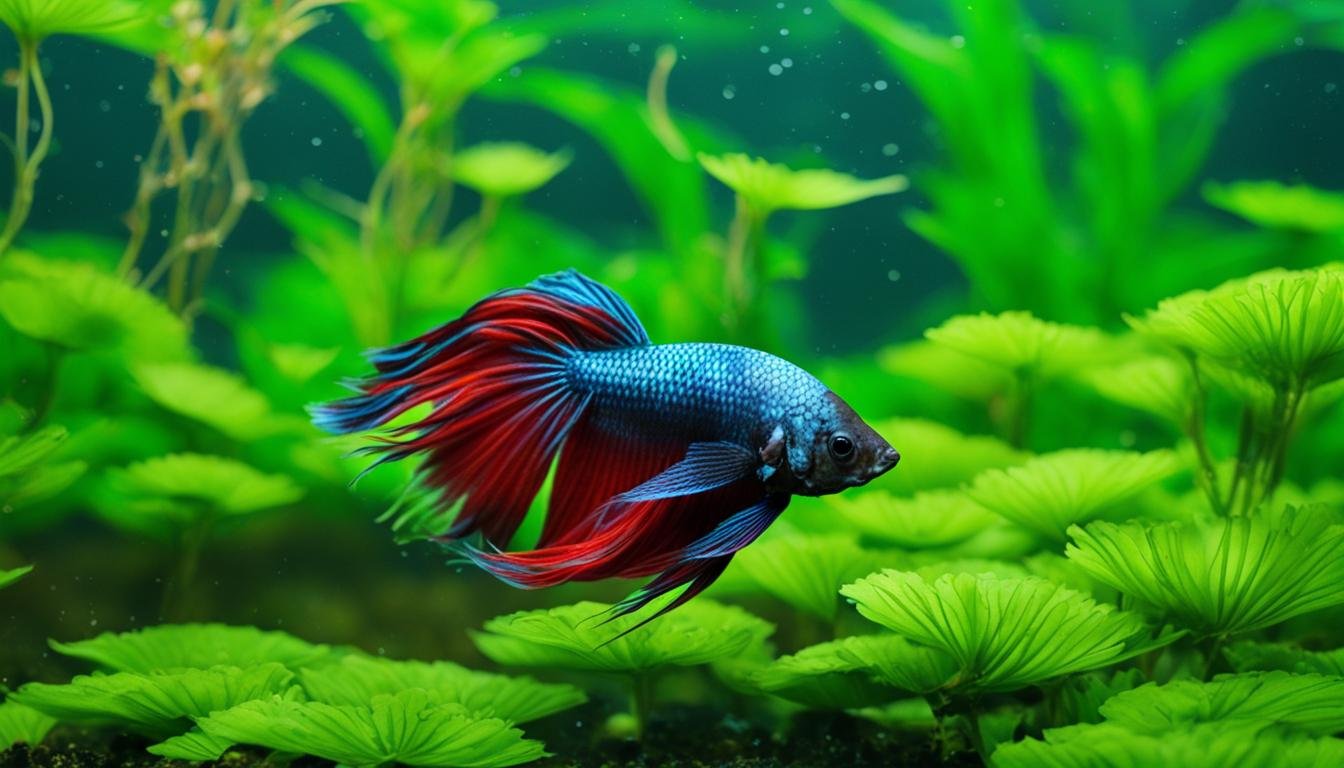
Is Duckweed Good For Betta Fish? Exploring Betta Care
Welcome to our article on the benefits of duckweed for betta fish! If you’re a betta fish owner, you may be wondering if duckweed is a suitable addition to your fish tank. In this article, we’ll explore the advantages of feeding betta fish duckweed and how it can enhance their overall care and well-being.
Duckweed is a popular choice among fishkeepers for its various benefits. Let’s discover why duckweed is good for betta fish and how it can contribute to their optimal health and happiness.
Key Takeaways:
- Duckweed can be a beneficial addition to a betta fish tank.
- Feeding betta fish duckweed offers numerous benefits for their health and well-being.
- Duckweed serves as a natural food source, providing essential nutrients for betta fish.
- It can improve water quality by absorbing excess nutrients and acting as a natural filter.
- Duckweed helps oxygenate the water, benefiting the overall environment of the tank.
The Benefits of Duckweed for Betta Fish
Duckweed offers several benefits for betta fish, making it a valuable addition to their diet and tank environment. Let’s explore the advantages of incorporating duckweed into the care of your betta fish.
1. Natural Food Source
Duckweed serves as a nutritious food source for betta fish. It contains essential nutrients like protein, vitamins, and minerals that contribute to their overall health. By including duckweed in their diet, betta fish can enjoy a balanced and varied meal.
2. Improved Digestion and Health
The small and easily digestible size of duckweed makes it ideal for betta fish. Consuming duckweed can help promote healthy digestion, preventing issues like bloating and constipation. Additionally, the nutrients in duckweed can support their immune system and enhance their overall well-being.
3. Balanced Diet
Incorporating duckweed into a betta fish’s diet helps provide a well-rounded and balanced meal. It complements their primary diet of pellets or flakes, ensuring they receive a diverse range of nutrients for optimal health and vitality.
4. Environmental Enrichment
Duckweed can enhance the betta fish tank environment by providing natural enrichment. Its floating nature creates a visually appealing green cover on the water’s surface, simulating a natural habitat for betta fish. This can reduce stress levels and contribute to a more peaceful and comfortable living environment for your betta fish.
In conclusion, duckweed offers various benefits for betta fish, including serving as a natural food source, improving digestion and overall health, providing a balanced diet, and enhancing their tank environment. By incorporating duckweed into their care regimen, you can promote the well-being of your betta fish and ensure they thrive in their aquatic habitat.
Improving Water Quality with Duckweed
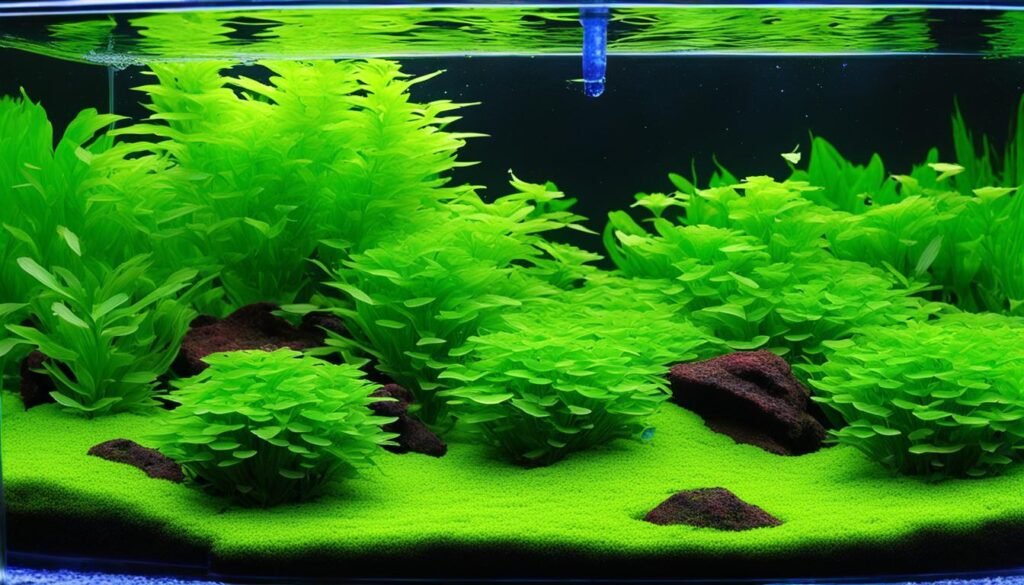
When it comes to creating a healthy environment for your betta fish, water quality is of utmost importance. One natural solution that can help improve water quality in a betta fish tank is the addition of duckweed. Duckweed has the remarkable ability to absorb excess nutrients like ammonia and nitrates from the water, acting as a natural filter. This not only improves the overall water quality but also reduces the risk of pollution and promotes a clean and balanced environment for your betta fish.
Beyond its filtration capabilities, the presence of duckweed in your betta fish tank can have other positive effects. The floating plant provides shade and cover, helping to reduce stress in betta fish. It also offers a natural habitat for beneficial bacteria, which play a crucial role in maintaining a healthy tank ecosystem. Additionally, the dense coverage of duckweed on the water’s surface helps to prevent excessive light penetration, which can inhibit the growth of unwanted algae.
Incorporating duckweed into your betta fish tank can be a great way to enhance water quality and create a more natural and balanced environment for your fish. However, it’s important to note that some betta fish may not be compatible with duckweed. While most bettas enjoy the presence of duckweed, there are some individuals who may show aggression towards the plant or simply show no interest in it as a source of food. It’s essential to observe your betta fish’s behavior and adjust accordingly to ensure their well-being.
Duckweed in Betta Fish Tank: Tips for Success
- Introduce duckweed gradually to your betta fish tank to allow your fish to acclimate to its presence.
- Regularly monitor water quality parameters such as ammonia and nitrate levels to ensure the effectiveness of duckweed in maintaining water quality.
- Trim and remove excess duckweed to prevent it from overtaking the tank and blocking out light from other plants.
- Consider providing alternative hiding spots in the tank to ensure that betta fish can retreat and feel secure even if duckweed is not present in abundance.
In conclusion, incorporating duckweed into a betta fish tank can help improve water quality and create a more natural environment for your fish. It serves as a natural filter, reduces stress, and provides shade and cover. However, it’s important to observe your betta fish’s behavior and adjust accordingly to ensure compatibility. By following these tips, you can successfully introduce and manage duckweed in your betta fish tank for the benefit of your fish’s health and well-being.
Providing Oxygenation with Duckweed
One of the remarkable benefits of duckweed in a betta fish tank is its ability to provide oxygenation. Duckweed undergoes photosynthesis, absorbing carbon dioxide and releasing oxygen into the water. This process helps to improve the oxygen levels in the tank, benefitting the overall well-being of the betta fish and other aquatic organisms.
In addition to enhancing oxygen levels, duckweed also contributes to the aesthetic appeal of the tank. The small, vibrant green leaves floating on the surface create a visually pleasing environment that mimics the natural habitat of betta fish.
To maximize the oxygenation effects of duckweed, it is recommended to maintain a balanced population of the plant in your tank. Regular monitoring and trimming will prevent excessive growth, allowing the duckweed to efficiently perform its oxygenating function without overcrowding the tank. Remember that maintaining a balanced tank ecosystem is crucial in ensuring the health and vitality of your betta fish.
Benefits of Oxygenation in a Betta Fish Tank
- Improved oxygen levels promote a healthier and more active betta fish
- Increased oxygenation aids in the breakdown of waste products, maintaining water quality
- Enhanced oxygenation reduces the risk of stagnant water and the growth of harmful bacteria
Managing Duckweed for Optimal Oxygenation
- Regularly monitor and trim duckweed to prevent overgrowth and maintain a balanced population
- Ensure sufficient lighting in the tank to support photosynthesis and oxygen production
- Consider supplementing with other oxygenating plants to enhance the oxygenation process
The Benefits of Duckweed as a Natural Hiding Spot for Betta Fish
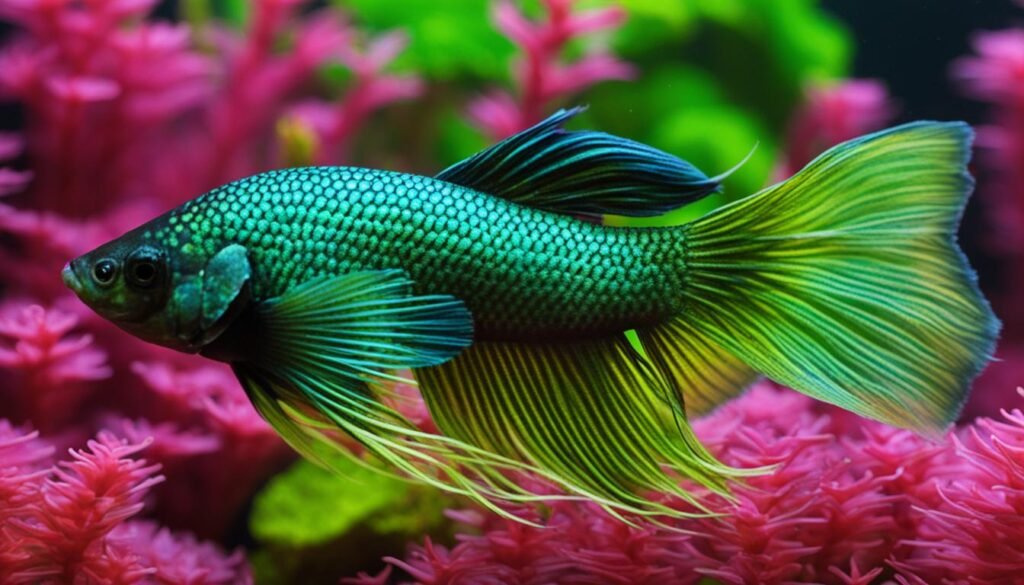
Betta fish naturally love to hide and seek shelter in their environment. Providing them with suitable hiding spots is essential for their well-being. One excellent option for creating a natural hiding spot in a betta fish tank is duckweed.
Duckweed is a floating plant that forms a dense cover on the surface of the water. Its small leaves create a perfect hiding spot for betta fish, allowing them to disappear out of sight whenever they feel the need. This added sense of security can help reduce stress and promote a healthier environment for your betta fish.
Benefits of using duckweed as a hiding spot for betta fish:
- Enhances the natural behavior of betta fish by providing a safe and secure hiding spot.
- Reduces stress levels in betta fish, promoting overall well-being.
- Creates a visually appealing and natural-looking environment in the tank.
- Does not require any special care or maintenance, making it easy to incorporate into your tank setup.
- Provides additional surface cover, reducing excess light and preventing the growth of algae.
By adding duckweed to your betta fish tank, you can create a natural hiding spot that mimics their natural habitat and enhances their overall well-being.
Choosing the Right Live Plants for Betta Fish Tanks
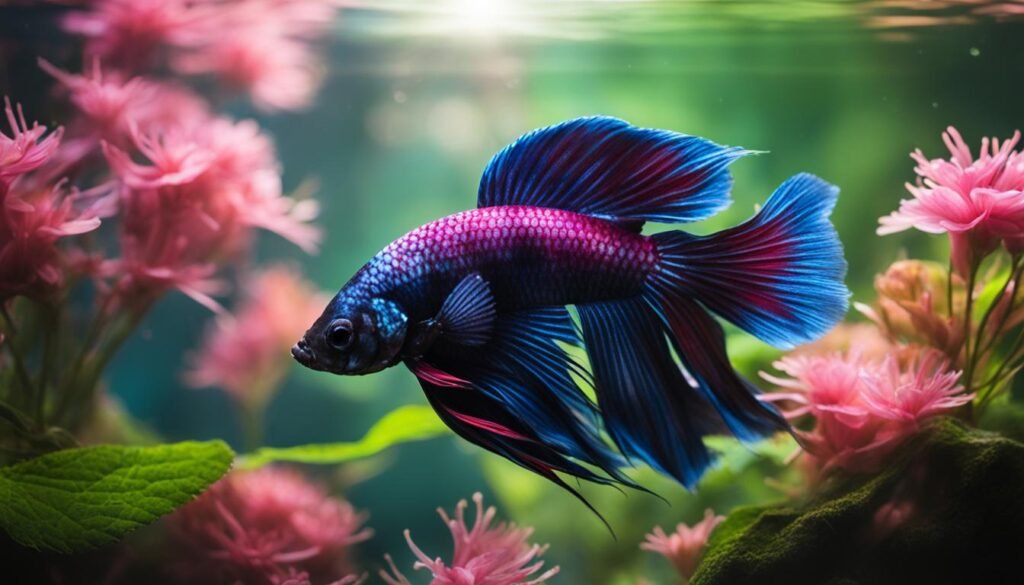
When it comes to creating a thriving and visually appealing betta fish tank, live plants are a fantastic addition. They not only provide natural beauty but also contribute to the overall health and well-being of your betta fish. While duckweed is a popular choice, there are other live plants that can complement your betta’s habitat.
Here are some of the best live plants for betta fish tanks:
- Java Moss: Known for its versatility, Java Moss can be attached to driftwood or left to float freely in the tank. It provides an excellent hiding spot for bettas and helps to filter the water.
- Java Fern: Another resilient plant, Java Fern can be anchored to decorations or left to float. It adds a touch of elegance to the tank and offers bettas additional hiding places.
- Amazon Frogbit: This floating plant forms a lush blanket on the water’s surface, providing shade and a sense of security for betta fish. It also assists in maintaining water quality by absorbing excess nutrients.
- Anacharis: Anacharis is an excellent choice for betta fish tanks as it helps to oxygenate the water and improve its quality. Its dense foliage also provides a natural hiding place for bettas.
- Anubias Nana: With its attractive, broad leaves, Anubias Nana adds beauty and a sense of tranquility to a betta fish tank. This plant is easy to care for and can be attached to rocks or driftwood.
By incorporating these live plants into your betta fish tank, you can create a vibrant and thriving environment for your betta while enhancing the aesthetic appeal of their habitat.
The Drawbacks of Duckweed
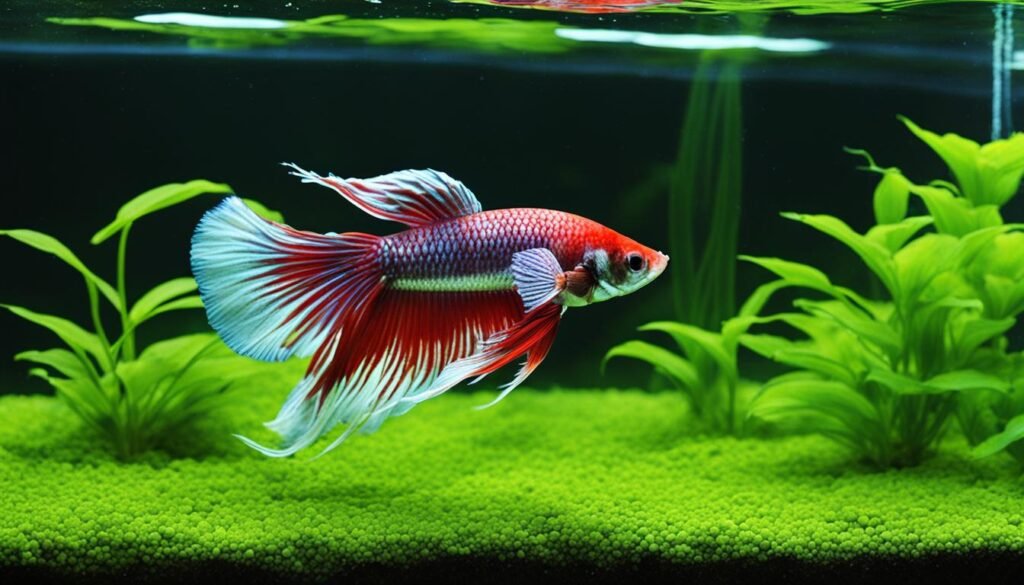
While duckweed has its benefits, there are also some drawbacks to consider when it comes to its use in betta fish tanks. It’s important to weigh these factors before deciding whether or not to introduce duckweed into your tank.
1. Overgrowth and Light Obstruction
Duckweed has a tendency to grow rapidly and can quickly cover the surface of the tank. This can obstruct light from reaching other plants in the tank, potentially hindering their growth. It’s important to regularly trim and remove excess duckweed to prevent it from taking over the tank and disrupting the balance of the ecosystem.
2. Betta Fish Compatibility
While some betta fish may enjoy the presence of duckweed, others may not show much interest in it as a food source. It’s essential to observe your betta fish’s behavior and appetite when introducing duckweed to the tank. If they are not consuming it or if it causes them any distress, it may be necessary to consider alternative food sources.
3. Maintenance and Management
Maintaining duckweed in a betta fish tank requires regular monitoring and management. If left unchecked, it can quickly overgrow and cause issues in the tank. This includes blocking filters, reducing oxygen levels, and creating an unsightly appearance. Proper maintenance involves trimming and removing excess duckweed to maintain a balanced tank environment.
Despite these drawbacks, many betta fish owners still find value in incorporating duckweed into their tanks. It’s important to weigh the benefits against the potential challenges and make an informed decision based on the specific needs and preferences of your betta fish.
Summary:
- Duckweed can quickly overgrow and obstruct light in the tank.
- Not all betta fish may be interested in consuming duckweed.
- Regular maintenance and management are required to prevent overgrowth.
Managing Duckweed in Betta Fish Tanks
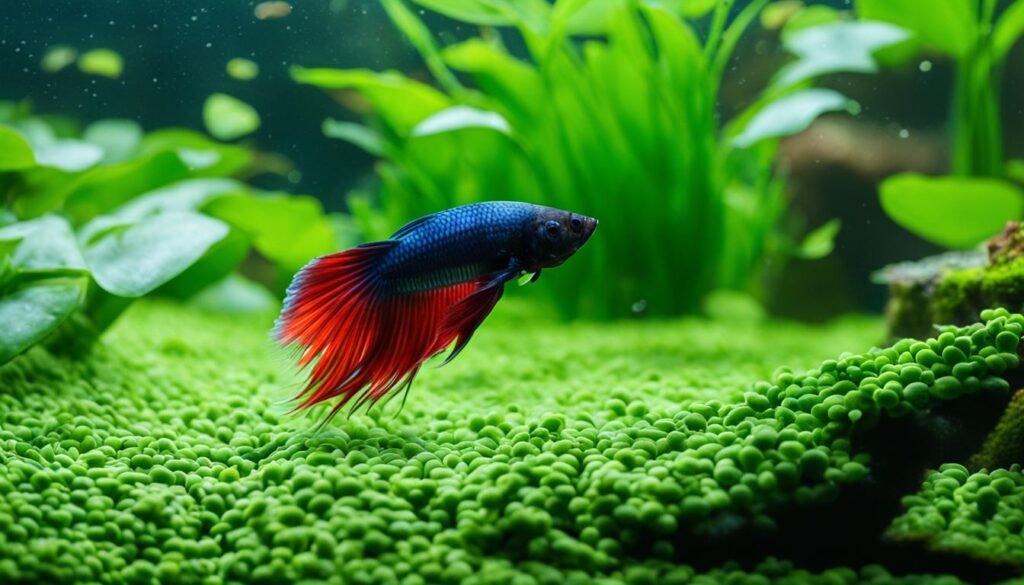
Duckweed can be a valuable addition to a betta fish tank, providing numerous benefits such as natural food sources, improved water quality, oxygenation, and a hiding spot. However, it’s important to manage duckweed properly to prevent overgrowth and maintain a balanced tank ecosystem.
1. Trimming and Removal
To control the growth of duckweed in your betta fish tank, regularly trim and remove excess duckweed. This can be done by gently scooping out the excess duckweed using a net or your hands. By maintaining a moderate amount of duckweed in the tank, you can prevent it from completely covering the water’s surface and limiting light penetration to other plants.
2. Strategic Placement
If you want to keep duckweed in your betta fish tank while avoiding overgrowth, consider placing it in a specific area. You can create a separate floating container or section of the tank dedicated to duckweed. This will help contain its growth and prevent it from spreading uncontrollably throughout the entire tank.
3. Balance with Other Plants
When incorporating duckweed into your betta fish tank, it’s important to ensure a proper balance with other live plants. Be mindful of the needs and growth rates of different plant species in your tank. By selecting compatible plants and maintaining a healthy ratio between duckweed and other plants, you can create a harmonious aquatic environment for your betta fish.
4. Regular Monitoring
Stay vigilant and monitor the growth of duckweed in your betta fish tank. If you notice excessive growth or the duckweed starting to take over, take immediate action to trim and remove the extra duckweed. Regular monitoring will help you maintain a healthy tank ecosystem and prevent any potential issues caused by unchecked duckweed growth.
What Not to Include in a Betta Fish Tank
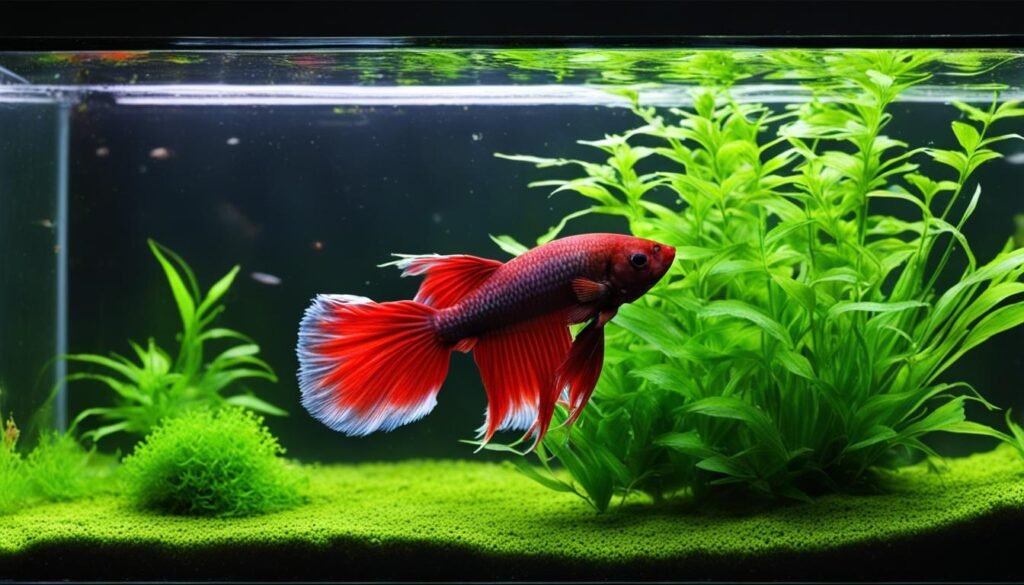
While creating a betta fish tank, it’s important to choose the right plants that promote a healthy environment for your betta fish. However, there are certain plants that should be avoided to ensure the well-being of your fish.
Plants to Avoid:
1. Duckweed (Lemna spp.): While duckweed can provide benefits such as natural food sources and oxygenation, it has a tendency to overgrow and cover the surface of the tank. This can prevent light from reaching other plants and suffocate the fish if not properly managed.
2. Non-aquatic plants: Plants like peace lilies and bamboo might add aesthetic appeal to your tank, but they are not suitable for betta fish tanks. These plants thrive in terrestrial environments and can rot when submerged, causing water pollution and potentially harming the fish.
Tips for Betta Fish Tank Setup:
1. Research suitable plants: Consider live plants that are compatible with betta fish tanks, such as Java Moss, Java Fern, Amazon Frogbit, Anacharis, and Anubias Nana. These plants provide similar benefits to duckweed without the risk of overgrowth.
2. Maintain a balanced ecosystem: Regularly trim and remove excess plants to prevent overcrowding and ensure a balanced tank ecosystem. This will promote better water circulation and prevent the accumulation of waste.
By avoiding plants like duckweed and non-aquatic species, and opting for suitable live plants, you can create a healthier and more enjoyable environment for your betta fish.
The Importance of Proper Betta Fish Care
Proper betta fish care goes beyond just providing a beautiful tank setup. It involves ensuring the overall health and well-being of these magnificent creatures. By understanding their unique needs and creating the right environment, you can help your betta fish thrive for years to come.
When it comes to betta fish tank setup, there are a few key factors to consider. First, maintaining the appropriate water temperature is essential. Bettas are tropical fish and prefer water temperatures between 76°F and 82°F. Use a heater to keep the water consistently warm and use a thermometer to monitor the temperature.
In addition to temperature, the diet of betta fish is crucial for their health. A balanced and varied diet is essential, consisting of high-quality betta fish pellets or flakes, supplemented with occasional treats like bloodworms or brine shrimp. Ensure that you feed them small portions once or twice a day, as overfeeding can lead to obesity and other health issues.
Lastly, consider the compatibility of tank mates if you plan to introduce them. While bettas can live alone, they can also coexist with certain fish species. Avoid adding any aggressive or fin-nipping fish that may harm or stress your betta. Research and choose tank mates that have similar water temperature and habitat preferences to promote a harmonious tank environment.
Creating a Healthy Environment for Betta Fish
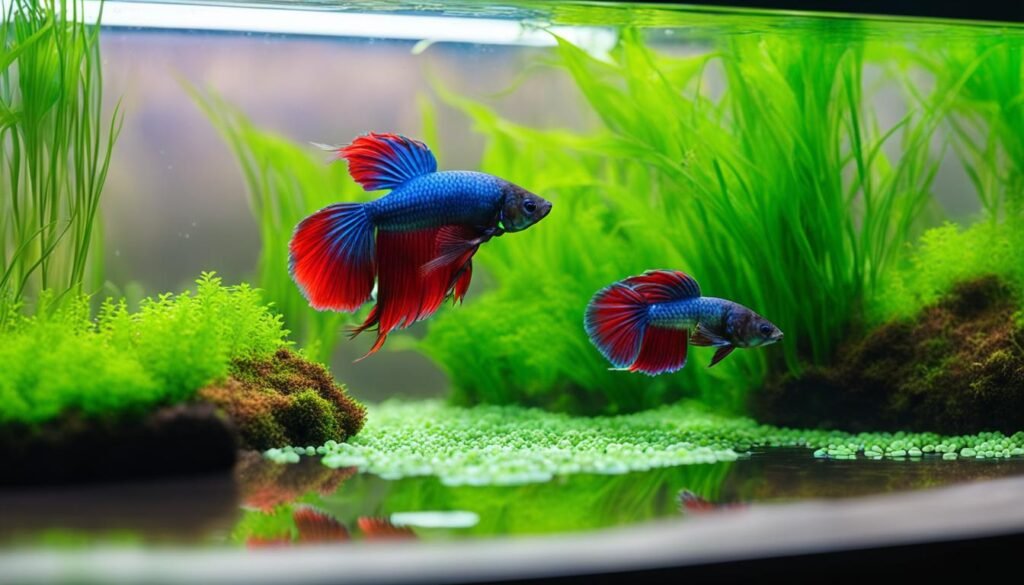
When it comes to betta fish care, creating a healthy environment for your aquatic friend is of utmost importance. A well-designed betta fish tank setup can significantly contribute to their overall well-being and happiness. Here are some essential factors to consider:
1. Tank Size and Water Temperature:
Ensure that your betta fish has sufficient space to swim and explore. A tank size of at least 5 gallons is recommended to provide enough room for your pet. Additionally, maintaining the appropriate water temperature is crucial for their health. Betta fish thrive in water temperatures between 76°F and 82°F, so use a reliable aquarium heater to maintain a consistent temperature.
2. Proper Filtration and Water Quality:
Invest in a good-quality aquarium filter to keep the water clean and free from harmful substances. Regular water changes are also necessary to maintain optimal water quality. Test the water regularly for parameters such as ammonia, nitrites, and nitrates, and take necessary actions to keep these levels within acceptable limits.
3. Balancing the Betta Fish Diet:
A well-rounded diet is essential for your betta fish’s health and vitality. Provide a combination of high-quality betta fish pellets or flakes, freeze-dried or frozen foods, and live foods such as brine shrimp or bloodworms. Feed your betta fish small portions two to three times a day, ensuring they consume their food within a few minutes.
4. Compatibility with Tank Mates:
When considering adding tank mates to your betta fish tank, choose species that are compatible with bettas. Avoid aggressive or fin-nipping fish that may harm your betta. Research and select peaceful species that can coexist harmoniously with bettas, such as small tetras, snails, or shrimp.
By following these guidelines and creating an optimal betta fish tank setup, you can provide a healthy and thriving environment for your beloved betta fish. Remember to monitor their behavior and make adjustments as needed to ensure their well-being.
Conclusion
When considering the overall care and well-being of your betta fish, the addition of duckweed to their tank can be highly beneficial. Its numerous advantages make it a valuable asset to their environment.
Firstly, duckweed serves as a natural food source for betta fish, providing essential nutrients and promoting a balanced diet. Additionally, it helps improve water quality by absorbing excess nutrients, acting as a natural filter and creating a healthy environment for your fish.
Furthermore, duckweed contributes to oxygenation in the tank through photosynthesis, benefiting the well-being of your betta fish and other aquatic organisms. The floating layer of duckweed also offers a natural hiding spot, allowing your betta fish to feel secure and safe.
While managing the growth of duckweed is important to prevent overgrowth, its advantages make it an excellent addition to your betta fish tank. By providing optimal conditions and a suitable environment, you can ensure the health and well-being of your betta fish is prioritized.
FAQ
Is duckweed good for betta fish?
Yes, duckweed offers several benefits for betta fish. It can serve as a natural food source, improve digestion, and provide a balanced diet.
How does duckweed improve water quality in a betta fish tank?
Duckweed absorbs excess nutrients like ammonia and nitrates, acting as a natural filter and promoting a healthy tank environment.
Does duckweed provide oxygenation for betta fish tanks?
Yes, duckweed undergoes photosynthesis and releases oxygen into the water, improving oxygen levels in the tank.
Can betta fish hide in duckweed?
Absolutely! The floating layer of duckweed creates a dense cover on the water’s surface, providing a perfect hiding spot for betta fish.
Are there other suitable live plants for betta fish tanks?
Yes, Java Moss, Java Fern, Amazon Frogbit, Anacharis, and Anubias Nana are all excellent options that provide similar benefits.
What are the drawbacks of duckweed in a betta fish tank?
Duckweed can grow rapidly and cover the tank’s surface, preventing light from reaching other plants. Some betta fish may also not be interested in eating duckweed as a food source.
How should I manage duckweed in a betta fish tank?
Regular trimming and removal of excess duckweed is essential to prevent overgrowth and maintain a balanced tank ecosystem.
What plants should not be included in a betta fish tank?
Duckweed can overcrowd the tank and suffocate the fish if not managed properly. Non-aquatic plants like peace lilies and bamboo are also not suitable for betta fish tanks.
What factors should I consider for proper betta fish care?
Factors like water temperature, diet, and tank mates all play a role in the health and well-being of betta fish.
How can I create a healthy environment for betta fish?
Providing optimal conditions, including suitable water temperature, a balanced diet, and compatible tank mates, is crucial for the well-being of betta fish.
Leave a Reply